In May 2014 Life Without Barriers in the Northern Territory started delivering Home and Community Care (HACC) Services to the greater Darwin region. Funded by the Australian Government’s Department of Social Services, the service offered domestic assistance, transport, social support and a centre-based day program, as well as a wide range of home support services to older people in Darwin and the Top End region to support them to remain living independently in their own homes and provide access to their community. The service is for people over the age of 65 years old (50 years old and over for Aboriginal and Torres Strait Islander people) living in the greater Darwin region which covers the local government areas of Darwin, Palmerston and Litchfield.
Life Without Barriers was successful in receiving government funding to establish three Therapeutic Accommodation Support services, both Trauma Informed and Person Centred, to meet individual and complex support-needs of children and young people.
These needs can include support with behavioural, social, emotional and educational difficulties that occur with such frequency and adverse impact on their daily functioning that they require specialised, intensive support not generally available in traditional home-based care. While recognising the need to ensure a safe, predictable living environment, the Therapeutic Accommodation Support Model addresses the assessed needs in a planned, systematic way, with a focus on future-planning, skills development and goal attainment.
Since opening in 2013, our child care centres situated in the remote communities of Minjilang on Croker Island and Lajamanu on the edge of the Tanami Desert have provided high-quality and culturally sensitive services to up to 30 children each aged from six weeks old to five years.
We have run educational workshops for parents as well as on age appropriate activities, nutrition, health and hygiene to complement what the children learn while in child care. The centres have been supported by a local Community Advisory Group in each community, with all developments and decisions being discussed with groups prior to implementation.

